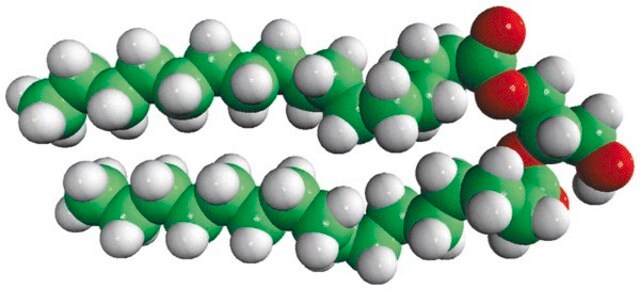850704P
Avanti
15:0 PE
1,2-dipentadecanoyl-sn-glycero-3-phosphoethanolamine, powder
Synonym(s):
PE(15:0/15:0); 110885
Sign Into View Organizational & Contract Pricing
All Photos(2)
About This Item
Empirical Formula (Hill Notation):
C35H70NO8P
CAS Number:
Molecular Weight:
663.91
UNSPSC Code:
51191904
NACRES:
NA.25
Recommended Products
Assay
>99% (TLC)
form
powder
packaging
pkg of 1 × 25 mg (850704P-25mg)
manufacturer/tradename
Avanti Research™ - A Croda Brand 850704P
lipid type
cardiolipins
phospholipids
shipped in
dry ice
storage temp.
−20°C
SMILES string
[H][C@@](COP([O-])(OCC[NH3+])=O)(OC(CCCCCCCCCCCCCC)=O)COC(CCCCCCCCCCCCCC)=O
General description
Phosphatidylethanolamine (PE) is a glycerophospholipid.
Application
1,2-dipentadecanoyl-sn-glycero-3-phosphoethanolamine (15:0 PE):
- has been used as an internal standard for BXD plasma samples in lipidomics analysis
- may be used as a phospholipid internal standard to analyze phospholipid species from a bacterial culture
- may be used as an internal standard in ultra-pressure liquid chromatography coupled to high-resolution quadrupole time-of-flight mass spectrometry analysis to study blood plasma lipidome profile
- may be used as an internal standard in 2D mass spectrometric analysis of hepatic lipid classes
Biochem/physiol Actions
Phosphoethanolamine (PE) serves as a precursor in membrane phospholipid biosynthesis.
Packaging
5 mL Amber Glass Screw Cap Vial (850704P-25mg)
Legal Information
Avanti Research is a trademark of Avanti Polar Lipids, LLC
Storage Class Code
11 - Combustible Solids
Certificates of Analysis (COA)
Search for Certificates of Analysis (COA) by entering the products Lot/Batch Number. Lot and Batch Numbers can be found on a product’s label following the words ‘Lot’ or ‘Batch’.
Already Own This Product?
Find documentation for the products that you have recently purchased in the Document Library.
Xianlin Han et al.
Analytical biochemistry, 330(2), 317-331 (2004-06-19)
Cellular lipids are composed of linear combinations of aliphatic chains covalently attached to backbones and/or head groups that collectively represent the cellular lipidome. Herein we present a novel two-dimensional electrospray ionization mass spectrometric approach to fingerprint most of the major
Radha M Golla et al.
ACS infectious diseases (2020-04-29)
Staphylococcus aureus is notoriously known for its rapid development of resistance to conventional antibiotics. S. aureus can alter its membrane composition to reduce the killing effect of antibiotics and antimicrobial peptides (AMPs). To obtain a more complete picture, this study
Mark Politz et al.
Bio-protocol, 3(21) (2013-11-05)
This protocol describes two similar methods for the extraction and methylation of fatty acids from bacterial cultures. The acid derivatization protocol (Lennen et al., 2013; Bligh and Dyer, 1959) results in the extraction and methylation of all fatty acids, both
S Imhasly et al.
BMC veterinary research, 11, 252-252 (2015-10-09)
The transition period of dairy cows, around parturition and the onset of lactation, involves endocrine and metabolic changes to compensate for an increased energy requirement aggravated by reduced feed intake. Transition cows adjust to the resulting negative energy balance with
Federica Gibellini et al.
IUBMB life, 62(6), 414-428 (2010-05-27)
The glycerophospholipids phosphatidylcholine (PC) and phosphatidylethanolamine (PE) account for greater than 50% of the total phospholipid species in eukaryotic membranes and thus play major roles in the structure and function of those membranes. In most eukaryotic cells, PC and PE
Our team of scientists has experience in all areas of research including Life Science, Material Science, Chemical Synthesis, Chromatography, Analytical and many others.
Contact Technical Service








